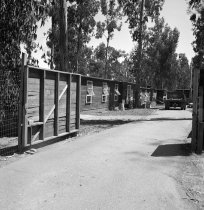Photo Record
Images

Metadata
Title |
Honor Camp at Coyote Point in San Mateo, July 20, 1965 |
Object Name |
Negative |
Description |
Honor Camp at Coyote Point in San Mateo, July 20, 1965. Black and white negative of Honor Camp at Coyote Point in San Mateo. Part of a series. Description provided by the photographer, Norton Pearl, with assistance from project organizer Cynthia Schreurs. |
Date |
July 20, 1965 |
Photographer |
Pearl, Norton |
Studio |
Norton Pearl Photography |
Processing Method |
Black and White |
Catalog Number |
2015.001.07954.1 |
Collection |
Archival Collection |
Place |
San Mateo, CA |
Notes |
Burlingame Advance Star 7/20/65 Excerpt from Honor Camp Alternative Park Compatible Reuse Feasibility Study for the County of San Mateo Parks Department, Final August 30, 2017, p. 1-1, 1-2 "The Honor Camp site was first used as a camp following World War II, when the Boy Scouts of America identified it as a location for an alternative summer camp. This need was triggered by the increased camping demand at their existing facilities at Camp Pescadero and Memorial Park (CP and MP). The Boy Scouts of America purchased the site, known as England Camp or England Estate, from A.E. England of San Francisco. A longtime supporter of the Boy Scouts, she sold her estate to the San Mateo County Area Council in 1948 for use as a new summer camp site for the Boy Scouts, called Camp Pomponio. Camp Pomponio opened in 1949 and included a camp kitchen, first aid station, and tent platforms. England's house was used by the camp ranger and program director and a new filtered water swimming pool was installed to replace the formal garden area. Because of the site's location at the end of a long winding dirt road (Camp Pomponio Road), buses would drop off Boy Scouts at Portola State Park and scouts would then hike two miles with camp staff into the camp. Camp Pomponio was one of the most visited Boy Scout camps in California during the 1950s. In 1961, Camp Pomponio became a site of interest as a part of a plan initiated by the San Mateo County Planning Commission to create a large regional park by connecting Memorial Park and Portola State Park. In the plan, a dam would be built across Pescadero Creek to create a new reservoir that would flood Camp Pomponio; an alternative site for Camp Pomponio would be created through a land swap for a location at a higher elevation. Due to the uncertainty created by this plan, in 1962, Camp Pomponio was leased to the County with an option to extend the lease or purchase the property after three years. The County purchased the property and the Boy Scouts relocated their camp to Camp Kit Carson in the Sierra Foothills. Shortly after, the site was converted into an "honor camp," a work camp designed to house low-risk offenders. Ultimately, the proposal for the dam was abandoned due to large opposition against the flooding of redwoods and thus the site continued to serve as an honor camp. During the period from 1962 to 2003, the honor camp was used by the County to house and rehabilitate low-risk offenders. Inmates would conduct public service such as clearing brush and creating fire breaks in the surrounding parklands. One famous inmate was Ken Kesey, a renowned author and counter culture icon of the 1960s. Kesey stayed at the camp for approximately six months and documented his time at Honor Camp in a journal which later became public after his death. Honor Camp has had several renovations: a medium security facility was added in the 1970s and an addition was built in 2002. Due to budget cuts, the Honor Camp site closed in 2003. In 2008, more than half million dollars were invested into renovations of the Medium Security Facility; however, since then, the facility has not been reopened. HONOR CAMP TODAY Since Honor Camp closed in 2003, the site has been abandoned and is closed to public access. The property is owned by San Mateo County and DPW, who manages the property and provides minimal maintenance. Visitors to Pescadero County Park may pass Honor Camp; however, signs located around the property indicate that it is not a public facility. Since closure, the vacant site has been subject to vandalism and theft with some damage to existing structures and infrastructure. Honor Camp can be a surprise to a visitor as it is a highly developed site within a densely forested natural area, including large structures, flush restrooms, cooking facilities, and sports fields. However, upon further examination, while the setting is interesting, the structures themselves have limited architectural value with the majority being beige, metal buildings or red painted wood structures. Some of the more unique features include benches and signs made by inmates and left at the site." |
Search Terms |
Coyote Point Landscapes San Mateo San Mateo County Sheriff's Office San Mateo County Sherriff's Honor Camp San Mateo Parks |
Subjects |
Architectural photographs Camps Landscape photographs |
Copyright |
Norton Pearl Photography / San Mateo County Historical Association |
Credit line |
Norton Pearl Photography / San Mateo County Historical Association |
